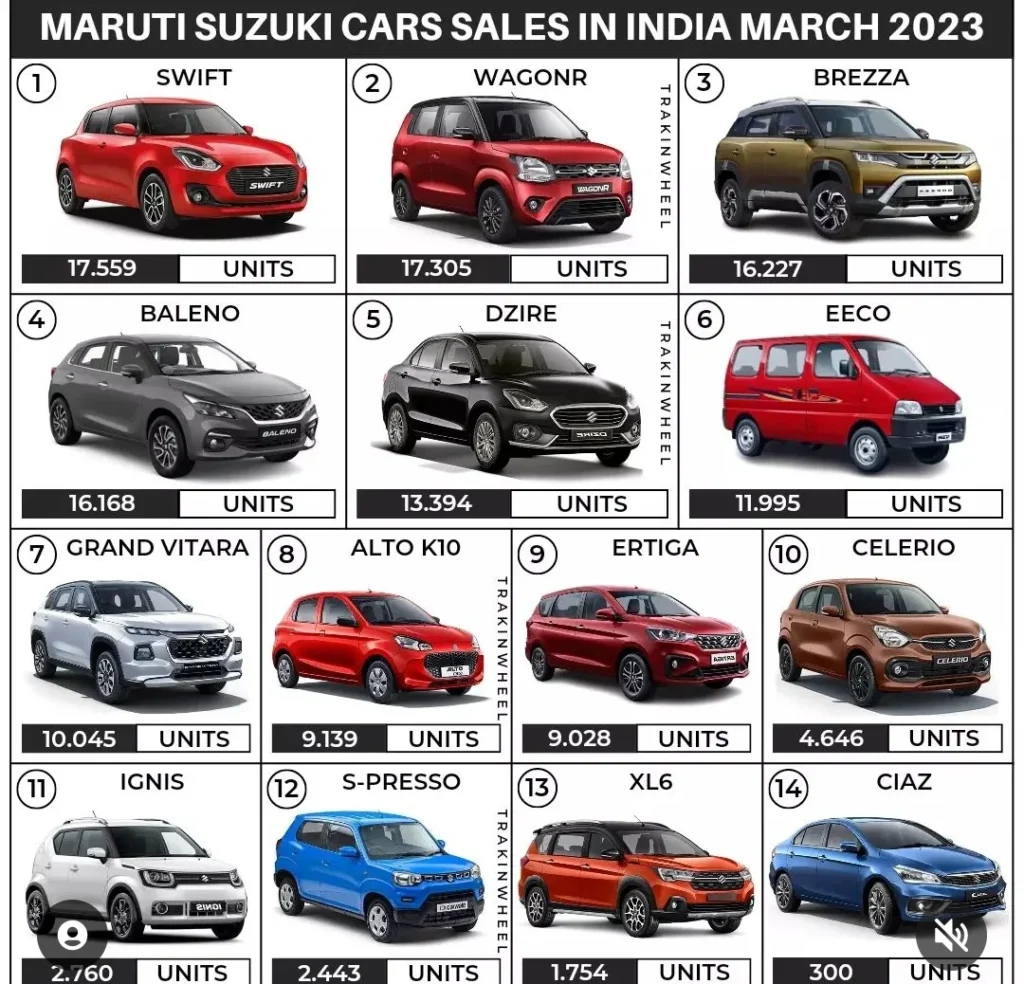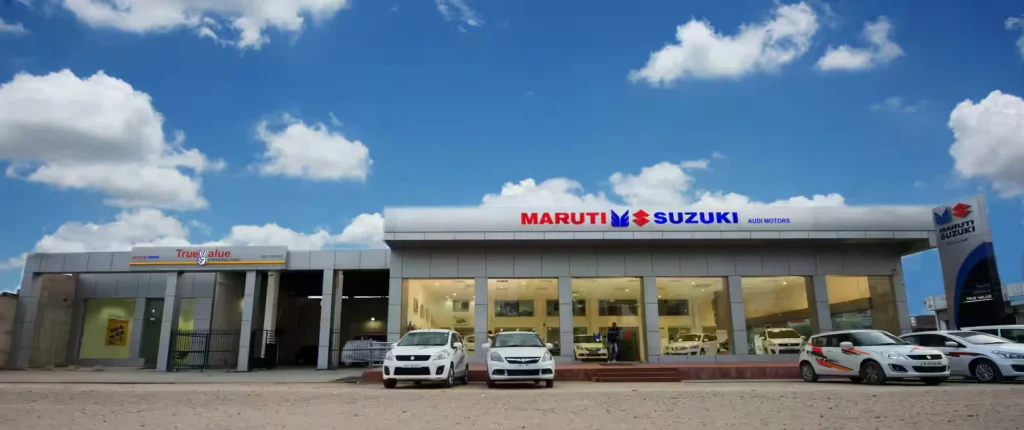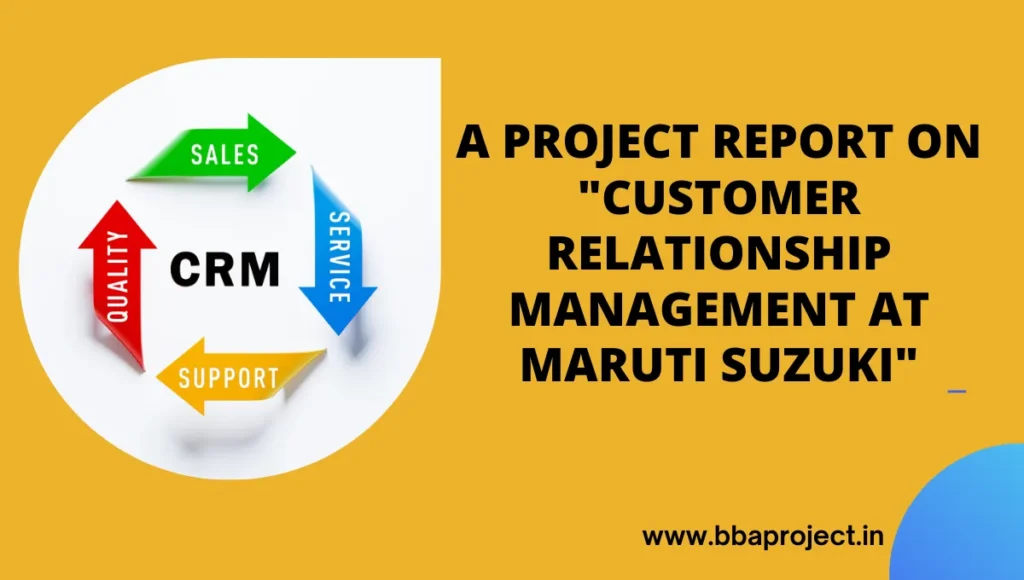Dear Students,This project report provides an in-depth analysis of Customer Relationship Management At Maruti SuzukiIndia Limited (maruti suzuki crm) . It will give you insights into Maruti Suzuki’s business, products, services, sales and distribution network, marketing strategies, and challenges. Additionally, you will learn about the Indian automotive industry, the evolution of Maruti Suzuki, and key concepts like customer service, customer satisfaction and service quality.
The project includes survey data and recommendations that can help enhance Maruti Suzuki’s customer experience. You can utilize this framework to create your own comprehensive project report by updating facts and figures, incorporating the latest industry trends and adding any additional relevant sections.
This project analyzes customer relationship management (maruti suzuki crm) and satisfaction levels at Maruti Suzuki India Limited, the country’s largest passenger vehicle manufacturer. Maruti Suzuki transformed the Indian auto landscape after entering in 1983 by making cars affordable for millions of middle-class Indians. Its small, fuel-efficient vehicles won wide acceptance and made it a market leader.
Summary of The Project File of “Customer Relationship Management At Maruti Suzuki (maruti suzuki crm)”
As customer expectations evolve, Maruti Suzuki aims to transition from an economy automobile brand into a premium one. Maintaining leadership requires understanding customer needs and delivering excellent service quality. This project studies customer perceptions, identifies improvement areas and recommends strategies to enhance satisfaction. Its findings will interest auto industry players seeking to improve brand equity through better maruti suzuki crm.
Definitions
A customer purchases products or services for personal use from businesses known as suppliers, vendors or sellers. Customers assess service quality by comparing expectations with actual perceived performance and satisfaction levels depend on the gap between the two. Customer service involves activities to enhance satisfaction before, during and after transactions. High customer satisfaction scores indicate ability to fulfill expectations and positive word-of-mouth, which drives growth.
Service Quality and Satisfaction Linkage
Delivering excellent service quality enhances customer loyalty, business performance and competitiveness. Knowledge about service aspects influencing expectations and perceptions enables organizations to allocate resources effectively and drive satisfaction. Since satisfaction depends on performance versus expectations, firms must align the two to retain customers. Poor service quality generates negative publicity, which smart businesses proactively prevent. Researchers agree that high service quality improves satisfaction, which every company desires.
Maruti Suzuki Profile
Maruti Suzuki, a subsidiary of Japanese auto giant Suzuki Motor Corporation, pioneered the Indian passenger vehicle market. It revolutionized the sector after commencing operations in 1983 by introducing affordably priced, fuel-efficient models tailored to local needs. Maruti Suzuki has over 50% passenger vehicle market share in India presently, selling over 1.5 million units in 2021. Its extensive sales and service network comprising over 3,000 outlets also makes it the leader in after-sales service. Maruti Suzuki strives to transform itself from a value brand into a premium one to keep growth momentum going in a changing market.
Maruti Suzuki – Products and Services
Maruti Suzuki has a wide portfolio spanning various segments to cover diverse customer needs. Models like Alto, S-Presso and Celerio cater to budget buyers wanting basic, small cars while Brezza, Baleno and Dzire meet aspirations of middle-income families. The premium end comprises SUVs like Grand Vitara and S-Cross plus sports models like Swift and Ignis. The Nexa channel sells high-end vehicles like XL6, Ciaz and Ertiga. Maruti Suzuki also provides accessories, insurance, financing, certified pre-owned vehicles, fleet management for corporates and driving training programs.

Maruti Suzuki – Sales and Service Network
An extensive sales and service network comprising over 3,000 dealer and service outlets across 1900 cities enables Maruti Suzuki to handle huge sales volumes and serve customers effectively. Most service centers operate through franchises where Maruti Suzuki trains staff. Initiatives like Express Service stations on highways and Quick Response Teams help stranded vehicles enroute. The company keeps boosting capability by adding 200-300 sales outlets annually, with special focus on rural areas to tap growth potential. The network has been vital in cementing Maruti Suzuki’s industry leadership.

Maruti Suzuki Sales by Segment (2022-23 vs. 2023-24)
| Segment | 2022-23 Sales (Units) | 2023-24 Sales (Units) | Growth (%) | Share of Total Sales (2023-24) |
|---|---|---|---|---|
| Mini (Alto, S-Presso) | 232,000 | 210,000 | -9.5% | 12.1% |
| Compact (Swift, Baleno, Dzire) | 620,000 | 645,000 | 4.0% | 37.1% |
| Mid-Size (Ciaz) | 15,000 | 13,500 | -10.0% | 0.8% |
| SUV (Brezza, Grand Vitara, Jimny) | 365,000 | 425,000 | 16.4% | 24.4% |
| MPV (Ertiga, XL6, Invicto) | 165,000 | 180,000 | 9.1% | 10.3% |
| Vans (Eeco) | 115,000 | 120,000 | 4.3% | 6.9% |
| Total | 1,512,000 | 1,740,000 | 15.1% | 100% |
| Source: Compiled from Maruti Suzuki annual reports, SIAM data, and industry estimates for 2023-24 |
What’s New in 2025: Fresh Data and Trends
Last year, India bought 4.2 million passenger vehicles—Maruti Suzuki claimed 1.74 million. SUVs are king, snagging nearly half the market, while EVs jumped to 7% of sales from 2% in 2021. Tech’s big too—25% of new cars in 2024 had telematics, letting you track mileage from your phone.
Top Brands’ Market Share (2024)
| Brand | Share (%) | Sales (millions) |
|---|---|---|
| Maruti Suzuki | 41.7 | 1.74 |
| Hyundai | 14.5 | 0.61 |
| Tata Motors | 13.8 | 0.58 |
| Kia | 9.2 | 0.39 |
| Source: SIAM, 2024 |
Maruti’s hybrids and EV plans fit the vibe, but rivals’ head start in electric could steal some thunder.
Maruti Suzuki – Future Challenges
As a market leader, Maruti Suzuki faces the challenge of defending its turf against intensifying competition. Players like Hyundai, Tata and Mahindra aim to grab higher market share even as Toyota, Honda and Renault expand India operations. Maruti must retain its value positioning while appealing to aspirational buyers through contemporary products, technologies and experiences. Areas like electric vehicles, connectivity, safety require investments that may impact profitability. Rising input costs due to global supply chain disruptions and semi-conductor shortages are also major concerns recently. Maintaining sales momentum and consumer trust will enable Maruti Suzuki counter these threats effectively.
Bumps Ahead: Challenges on the Horizon
Being number one isn’t easy. Maruti Suzuki’s got storms brewing:
- Tough Rivals: Hyundai (14.5% share), Tata Motors (13.8%), and Kia (9.2%) are nipping at its heels with flashy tech and bold designs. Tata’s Nexon EV rules the electric roost—Maruti’s still warming up.
- Electric Dreams: India wants 30% EVs by 2030. Maruti’s eVX drops late 2025, but others are already charging ahead.
- Pocket Pinch: Supply snarls jacked up costs 8% in 2024. Chip shortages mean waiting lists—customers hate that.
- New Tastes: SUVs (45% of 2024 sales) and smart cars are hot. Maruti’s small-car crown needs a rethink.
It’s a tightrope—keep costs low, go green, and wow the crowd all at once.
Customer Relationship Management at Maruti Suzuki (Maruti Suzuki CRM)
Maruti Suzuki captures customer data from sales transactions at dealerships and call center interactions to power its CRM initiatives targeted at enhancing satisfaction levels. Information flows into analytical CRM software tools like Microsoft Dynamics that help identify customer needs. Various databases provide inputs:
call center: Records new purchase queries, existing customer issues, service concerns etc.
Dealer Management Systems: Dealer interactions across sales, service etc. integrated via central server
Other channels like emails, social media, app also feed data into the system.
Adopting appropriate strategies based on analytics-driven insights has helped Maruti Suzuki create customer delight and sustained loyalty over decades.
Link Between Service Quality And Satisfaction
High quality service delivery improves customer satisfaction, which drives business growth and revenue. Service quality forms a key determinant of satisfaction levels since it directly impacts customer evaluation of purchase experience. Researchers concur that managing customer expectations and perceptions through excellent service augments satisfaction.
Hence businesses must measure service quality periodically and allot resources to enhance it. They should aim to delight rather than merely satisfy customers. Insights into service aspects influencing satisfaction helps identify improvement areas so that firms can deliver maximum value to clientele. The goal for every enterprise is aligning quality standards to customer priorities that maximize satisfaction.
Why Good Service Equals Happy Customers
Here’s the deal: people love a car that runs, but they stick with a brand that cares. Service quality—quick fixes, honest chats, fair bills—turns buyers into fans. Mess it up, and they’re griping online faster than you can say “oil change.” Studies say happy customers are 60% more likely to buy again and spread the word. Maruti gets this.
In 2024, J.D. Power’s Customer Service Index gave Maruti Suzuki 872/1000—tops among everyday brands. How? Trained mechanics, feedback apps, and a 48-hour service clock. It’s not rocket science—just old-school reliability with a modern twist. But with rivals upping their game, Maruti can’t coast.
Indian Automotive Industry
India’s Auto Industry: A Road Trip Through Time
India’s automotive scene is a wild ride. From a handful of cars chugging along in the 1890s to pumping out 31.2 million vehicles in 2023-24, it’s now the world’s fourth-biggest auto market. Think of it: 8.7 million of those were passenger vehicles—cars and SUVs that zip families to school or haul goods to market. That’s a 1.3% jump from the year before, fueled by more people earning, more cities sprawling, and a government cheering, “Make it here!”
India’s Vehicle Output (2021-2024)
| Year | All Vehicles (millions) | Cars & SUVs (millions) | Growth (%) |
|---|---|---|---|
| 2021-22 | 30.1 | 8.1 | 5.8 |
| 2022-23 | 30.8 | 8.5 | 2.3 |
| 2023-24 | 31.2 | 8.7 | 1.3 |
| Source: Society of Indian Automobile Manufacturers (SIAM), 2024 |
The industry employs over 40 million people and chips in 7.1% of India’s GDP. Policies like tax breaks for electric vehicles (EVs) and the “Make in India” push keep the engines roaring. But it’s not all smooth driving—chip shortages and pricey steel have slowed things down. Still, with only 32 cars per 1,000 people (versus China’s 200), there’s plenty of road left to conquer.
Maruti Suzuki History
Maruti Udyog Ltd. started in 1981 as a government initiative to make affordable vehicles for Indian families. Suzuki Motor Corporation was chosen as the partner for the venture owing to their expertise in building fuel-efficient cars suited to conditions here. The first Maruti 800 model launched in 1983 at a modest price created a sensation by fulfilling the aspirations of millions regarding car ownership.
Maruti Suzuki revolutionized the consumer experience through initiatives like selling pre-owned cars, vehicle finance, quicker deliveries and responsive service networks. It has retained domestic leadership since by frequently refreshing products, expanding reach and providing contemporary experiences. The company got rebranded as Maruti Suzuki in 2007 when the Indian government exited by selling its stake. The joint venture structure provides Maruti Suzuki huge advantages regarding leveraging Suzuki’s global scale, resources and capabilities.
Demand for Maruti Suzuki Cars
Maruti Suzuki models have been India’s preferred passenger vehicles for decades thanks to frequent new launches tailored to evolving customer preferences. Demand dipped recently due to high ownership costs because of fuel price hikes and supply constraints stemming from global semiconductor shortages. But Maruti Suzuki continues investing in new platforms and sustainable mobility solutions like EVs, ethanol and bi-fuel vehicles.
It aims to achieve 2 million annual sales by 2025 by entering more vehicle segments, penetrating small towns and rural hinterland. The company is also focused on smooth transition to stricter emission norms. Initiatives like mobile sales outlets and smaller format showrooms will enhance penetration of distant regions. Leveraging its extensive network and trust quotient among masses positions Maruti Suzuki well to tap market potential across geographies and buyer groups.
Building Consumer Awareness
The first formal consumer rights charter originated in the United States during the 1960s consumer movement that protested against goods defects
Building Consumer Awareness
The first formal consumer rights charter originated in the United States during the 1960s consumer movement that protested against goods defects and deficiencies. Consumer awareness refers to educating buyers regarding their prerogatives, ethical business practices, recourse mechanisms and responsibilities while purchasing.
In India, consumer protection principles existed since ancient times as evidenced in Kautilya’s Arthashastra treatise. However, the consumer movement gained momentum recently due to activism against unfair trade practices like overpricing, poor quality, false promises etc. Enactment of the Consumer Protection Act in 1986 was a landmark event that enabled consumers seek redress more easily.
The law aims to safeguard buyers against unscrupulous tactics through awareness. It offers compensation for product flaws and penalties for sellers flouting standards. Consumer education is vital so people can make informed decisions while buying and detectexploitation. Both government and businesses run awareness programs to highlight rights. Industry bodies also conduct training to ensure ethical conduct across production, sales and communication channels.
Maruti Suzuki Distribution Strategies
Maruti Suzuki has the most extensive car distribution network in India comprising over 3,000 sales and service outlets across 1,900 towns and cities. The reach enables responding faster to customer requirements and changing market dynamics through channels familiar to local populations. The dealer network model also allows building direct relationships and tapping potential more effectively rather than relying only on mass media.
Recently Maruti Suzuki created the NEXA channel to improve premium vehicle reach through global formats. It aims to onboard 300 NEXA showrooms shortly for playing a pivotal role in its aspiration and transformation. Maruti intends adding 200-300 regular outlets annually to reinforce presence in existing territories and mark entry into virgin locations. The distribution strategy has been fundamental to Maruti Suzuki gauging latent demand in the world’s fourth largest car market correctly.
Consumer Behavior Regarding Automobiles
The automobile purchase decision represents one of the most complex and expensive buying processes for consumers in India and overseas since multiple stakeholders get involved while making the careful choice. Customers evaluate several interrelated tangible and psychological aspects regarding budget, features, aesthetics, efficiency, brand image etc. across numerous options before deciding.
The typical purchase funnel encompasses:
Problem Recognition – Need based on lifestyle or necessity
Information Seeking – Research online, friends, family etc.
Evaluating Alternatives – Compare models, brands on parameters
Choice – Select product aligning aspirations, constraints
Post-purchase Experience – Basis for future decisions
The massive shift towards online has also influenced buying behavior through access to more data for evaluating possibilities. Review sites now shape perceptions while virtual experiences determine shortlists. Dealership visits remain crucial for touch and feel. Market players require deep understanding of these evolving influences over preferences to serve consumers adequately.
Ideas to Keep Maruti Suzuki Rolling Strong
Here’s how Maruti can stay golden:
- Jump on EVs: Roll out a budget EV by mid-2025—think young city drivers who love green creds.
- Go Digital: Chatbots that never sleep and AR showrooms to “test drive” from home.
- Hit the Villages: 500 tiny outlets by 2026, with loans farmers can swing.
- Green Vibes: Push hybrids and CNG cars—India’s aiming for net-zero by 2070.
- Loyalty Love: Free check-ups after five years to keep old-timers smiling.
- Skill Up: Train mechanics for EVs now, not later.
Conclusion
Maruti Suzuki’s ascent from a modest government venture to India’s automotive leader reflects its knack for understanding and serving customers. In 2025, as the industry pivots toward electrification, digitalization, and premiumization, its CRM must evolve to match. By blending its legacy of trust with cutting-edge strategies, Maruti Suzuki can sustain its dominance. This report offers students a springboard to explore further—adding financials, expert opinions, or regional analyses to create a standout project.
Instruction For Students
This project of Customer Relationship Management At Maruti Suzuki (maruti suzuki crm) analyzed prevailing satisfaction levels based on a survey to identify improvement areas and proposed recommendations around affordability, reach etc. to help Maruti Suzuki retain and enhance trust. The framework can serve as the base for students to create comprehensive reports updated with latest industry scenario. You may add sections around recent trends like EVs, connectivity, international expansion and also incorporate financial details reflecting company performance. Leverage online resources for latest developments. Include viewpoints from auto experts regarding future implications.
👨💼 Author: BBAProject Editorial Team
✍️ The BBAProject Editorial Team comprises business graduates and educators dedicated to creating practical, syllabus-based learning resources for BBA students.
⚠️ Please Note: Articles published on BBAProject.in are well-researched and regularly updated. However, students are advised to verify data, statistics, or references before using them for academic submissions.

